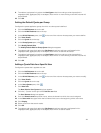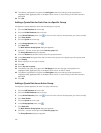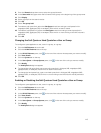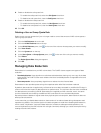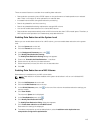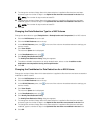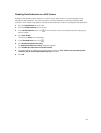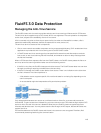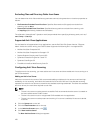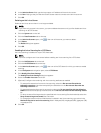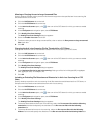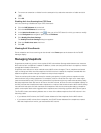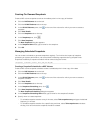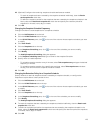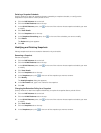
8
FluidFS 3.0 Data Protection
Managing the Anti-Virus Service
The FluidFS cluster anti‐virus service provides real‐time anti‐virus scanning of files stored in CIFS shares.
The anti‐virus service applies only to CIFS shares; NFS is not supported. The scan operation is transparent
to the client, subject to the availability of an anti‐virus server.
A file is scanned only when a client tries to open the file (not when an infected file is written, a file is
opened to read/modify attributes, old files are opened for re‐write, and so on).
The anti‐virus service consists of two components:
• One or more network‐accessible computers running a supported third‐party, ICAP‐ enabled anti‐virus
application to provide the anti‐virus scanning service to the FluidFS cluster.
• A FluidFS cluster anti‐virus scanning policy that specifies file extensions and directories to exclude
from scans, an anti‐virus scanning file size threshold, and whether to allow or deny files larger than
the file size threshold.
When a CIFS share client requests a file from the FluidFS cluster, the FluidFS cluster passes the file to an
anti‐virus server for scanning and then takes one of the following actions:
• If the file is virus‐free, the FluidFS cluster permits client access. The FluidFS cluster does not scan that
file again, providing it remains unmodified since the last check.
• If the file is infected, the FluidFS cluster denies client access. There is no indication to the client that
the file is infected. The client experience is:
– A file deletion returns a system‐specific ʺfile not foundʺ state for a missing file, depending on the
client’s computer.
– An access denial might be interpreted as a file permissions problem.
Only storage administrators can recover an uninfected version of the file, or access and process the
infected file. To gain access to an infected file, you must connect to the CIFS share through another CIFS
share on which the anti‐virus service is disabled. Otherwise, the FluidFS cluster recognizes the file as
infected, and denies access. You may also access the file through an NFS export, because NFS does not
support anti‐virus.
File transfers between the FluidFS cluster and the anti‐virus server are not encrypted. Therefore, Dell
recommends protecting/restricting the communication.
119



